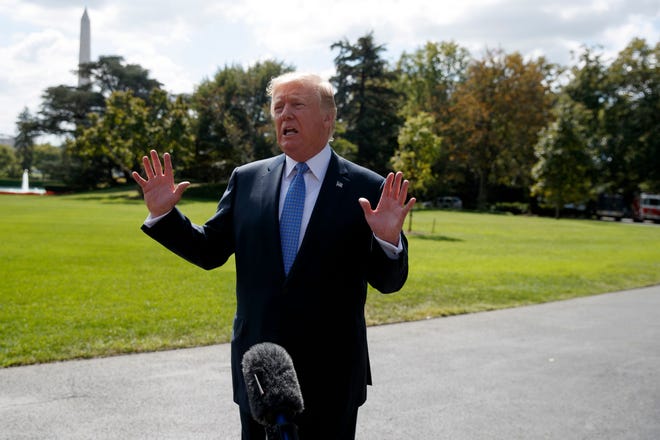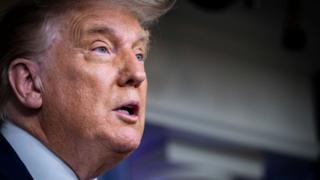
President Trump responds to a question about Ukraine and the whistleblower report during a joint news conference with Finland’s President Sauli Niinisto at the White House. (Kevin Lamarque/Reuters)
The unnamed CIA employee who reported President Trump’s effort to use diplomacy with Ukraine for personal political gain has something in common with A. Ernest Fitzgerald — White House wrath.
Fitzgerald was an Air Force senior financial management specialist when he told Congress about a $2 billion cost overrun on Lockheed C-5A transport planes. That 1968 testimony was followed by other congressional appearances, a government probe of his private life and a smear campaign against him. He was fired in 1970 at the direction of President Richard Nixon, who has something in common with Trump — potential impeachment.
“This guy that was fired,” Nixon bragged in a Jan. 31, 1973, taped White House conversation. “I said get rid of that son of a bitch.”
Fitzgerald eventually was reinstated with back pay. Now Trump wants the CIA employee, whose anonymity is protected by law, to be revealed. “This country has to find out who that person was, because that person is a spy, in my opinion,” Trump said Wednesday.
Whistleblowers are often punished, even as federal officials say they support the right of workers to report wrongdoing.
“As a rule, whistleblowing is an act of professional suicide,” said Tom Devine, legal director of the Government Accountability Project that defends whistleblowers. The threat of retaliation “exponentially increases when Trump calls you a spy.”
It’s not just government retaliation that concerns Danielle Brian, executive director of the Project on Government Oversight, which Fitzgerald helped found. “I’m frankly terrified for his personal safety,” she said, citing Trump’s words. She’s also worried because of the $50,000 reward for “information relating to the identity of the ‘Trump Whistleblower’ ” offered by Jack Burkman and Jacob Wohl, according to the Washington Examiner, which previously branded them “right-wing smear merchants.”
Like Fitzgerald, who died in January, more recent federal employees felt the whip of retribution for exposing government wrongdoing. We contacted three former national security whistleblowers whose stories of official revenge are a frightful warning to the CIA staffer. Yet all three would do it again, in service to their country.
Jane Turner was an FBI agent when she spoke about malfeasance related to investigations of crimes against Indian Country children and thefts by fellow agents from New York City’s Ground Zero. She was forced out in 2003 following a series of retaliatory measures. She fought back. A 2015 Government Accountability Report critical of FBI whistleblower procedures said the Justice Department “ultimately found in her favor in 2013 — over 10 years later.”
“Was the destruction of my career and family worth the excruciating time and money, ostracism and vilification? No,” she said Wednesday. “Was standing up and doing the ethical, legal and moral whistleblowing the right thing? Yes. Would I do it again? My moral and legal compass would not allow any different course of action.”
Her advice to the CIA whistleblower: “Carefully weigh the costs to you, your family and your career when deciding whether to blow the whistle. And document, document, document … because the hierarchy will lie.”
Teresa Chambers was the U.S. Park Police chief. Highly ranked, she didn’t consider herself a whistleblower, yet was treated with the scorn that too often greets renegade truth-tellers. Her sin — advocating for greater agency resources.
Her on-the-record remarks for a 2003 Washington Post article led to her firing. Her comments, about the need for more officers to patrol the Baltimore-Washington Parkway and federal lands in the District, seemed innocuous. But they led to retaliation from her supervisors, she said.
“Without warning, I was catapulted from a rising star who had devoted her life to her profession and was transformed to a shunned employee who was stripped of her gun and badge and paraded past her co-workers as she was escorted away by armed DOI [Department of Interior] employees,” she said. “I felt betrayed by my superiors — the very people who often praised my leadership and accomplishments.”
Intelligence community employees, like the CIA staffer, have fewer whistleblower protections than other feds, like Chambers. Nonetheless, “my experience is that those protections are often in written words only,” she said. “Many of the steps I had to take were a farce … It became clear to me early on that the actual facts in my case did not seem to matter to anyone along the way.”
Chambers was reinstated after an emotionally draining fight — “seven years, one month and 26 days after my nightmare began” — against the government she protected. Despite the retribution, she is “absolutely” glad she spoke out.
“Telling the truth, especially as a police official, is always the right thing to do,” she said.
But it comes with a steep price.
So steep that “I’d first try to talk them out of it because hell on Earth will come at them, making you lose everything and destroy your family.”
That’s the advice Robert MacLean has for the CIA whistleblower.
MacLean, a former air marshal, won the first federal whistleblower case before the Supreme Court in 2015. Yet now he’s driving for Uber and Lyft, his legal victory frustrated by a series of Transportation Department maneuvers.
He was fired in 2006 after complaining, first internally and later in a leak to MSNBC, about a decision to temporarily cancel overnight air marshal missions to save on hotel bills, days after an agency warning about potential hijacking.
Would he blow the whistle again? “In a heartbeat. I was a sworn law enforcement officer, exposing violations of law and dangers to public safety.”
But, MacLean added, “it wrecked my career and continues to make my children miserable. Many family members lecture me that I should’ve remained silent because nobody cares and the wrongdoers are never held accountable.”
Read more:
Report says procedures put a chilling effect on potential FBI whistleblowers


